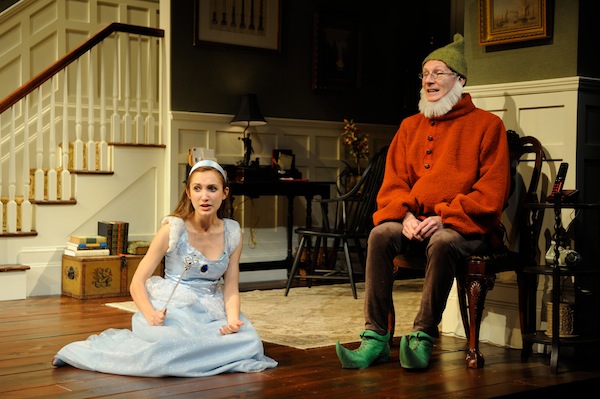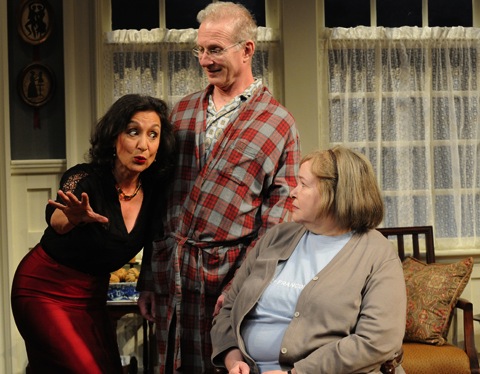Theater Review: Chekhov Lite — “Vanya and Sonia and Masha and Spike”
Chekhov’s jokes are the inevitable by-products of his characters confronting life’s absurdities; Christopher Durang is content to wring laughs out of wacky situations and cartoon caricatures.
Vanya and Sonia and Masha and Spike by Christopher Durang. Directed by Curt Columbus. Staged by the Trinity Repertory Company in the Sarah and Joseph Dowling, Jr., Theater, Providence, Rhode Island, through December 22.

Sylvia Kates (Nina) and Brian McEleney (Vanya) talk things over in the Trinity Repertory Company production of “Vanya and Sonia and Masha and Spike.” Photo: Michael Guy.
By Bill Marx
What role poses the ultimate challenge for male actors? The answer used to be that ‘They all want to play Hamlet.’ Today, the impregnable dream part for ambitious macho performers would most likely be Batman. Most playwrights wanted (and I suspect still yearn) to write like Anton Chekhov, to evoke his indelible sense of theatrical balance. The Russian playwright’s fusion of mirth and melancholy, complex characterization and innovative techniques, nostalgia and modernity, authorial impassivity and humanity, remains an artistic high water mark. Ibsen and Shaw’s self-conscious crusades to dramatize the truth carry much less weight, at least on Broadway and among regional theaters, than Chekhov’s tough/tender exploration of the muddle of existence.
In his 2013 Tony award-winning comedy Vanya and Sonia and Masha and Spike, Christopher Durang pays amusing homage to The Cherry Orchard, Uncle Vanya, Three Sisters, and The Seagull though affectionate pastiche. His Americanized version (set in Bucks County, Pennsylvania) takes motifs from Chekhov’s major plays and applies them to the crises of a family of baby boomers whose members are either terrified that they haven’t lived or that the high life is coming to an end. The result, in the amiable New England premiere production from the Trinity Repertory Company, is cheerfully superficial, the script’s one-liners often owing more to Neil Simon than to the penetrating humor of Chekhov. The latter’s jokes are the inevitable by-products of his characters confronting life’s absurdities; Durang is content to wring laughs out of wacky situations and cartoon caricatures.
The irony is that Durang is capable of producing a much more pointed satiric vision of the terrors of family life. His black comedy The Marriage of Bette and Boo, produced by the TRC in 1985 via a masterfully barbed production directed by Adrian Hall, is a very dark, risky indictment of domestic life, a sort of cosmic blues in which babies are literally dropped into a hostile world. Disappointingly, there is little of that kind of zany power in this play, perhaps because the earlier script takes its cue from the lacerating works of Samuel Beckett and Edward Albee. In Vanya and Sonia and Masha and Spike Durang has too much fun coming up with askew equivalents for the situations in Chekhov’s plays while also giving himself the opportunity to mock Hollywood movies, aging actresses, young hunks, new technology, and cultural decay. Beware of any speeches — even self-depredcating ones — that begin with “I am not a conservative but …” And, of course, the play’s Generation X’er, a preening representative of techno-ego banality, is balanced out by a Generation Y’er who adores the films of Ingmar Bergman and the music of the Beatles. No one need leave the theater in panic.
The material above suggests that Vanya and Sonia and Masha and Spike is an example of a new genre, sentimental plays that purport to focus on the plight of baby boomers who are beginning to feel their age. (Durang is 64.) The dramatic approach flirts with revelations of futility and regret, but then pulls back on the intimations of mortality. By turning Chekhov on his head, the playwright manages to head off real world anxieties through a convenient ‘literary’ framing device, making extra sure there are no upsets by supplying a relatively upbeat ending for characters who are — after decades of inaction or blindness – suddenly raging against the dying of the light.

Phyllis Kay (Masha), Brian McEleney (Vanya), and (Sonia) Janice Duclos in the Trinity Rep Company production of “Vanya and Sonia and Masha and Spike.” Photo: Mark Turek.
The premise of the play is that theater-loving English professors have named their kids after characters in Chekhov’s plays. Vanya and adopted sister Sonia stayed at home to take care of their slowly declining parents, while the beautiful Masha left to have a successful career in Hollywood, her big salary earned by starring in action films that pay the bills. Vanya and Sonia, repressed and socially awkward, sit around the house lamenting that they have never had much of a life, an Odd Couple-inspired bickering (I missed the first couple of minutes of the performance) enlivened by the appearance of a cleaning woman named Cassandra who fancies herself a modern-day seer, intoning depressing, yet amusingly over-the-top, prophecies that the end for the pair is nigh.
And she appears to be right — the narcissistic-to-the-max Masha returns with muscle-crazed boy toy Spike in tow and a yen to sell the homestead, with its mini cherry orchard and lakeside view. Masha’s plans are complicated by what happens at a costume party in which she is dressed in the guise of Snow White (from the Walt Disney cartoon version). At her insistence, everyone else — Vanya, Sonia, Spike and the young wanna-be actress Nina — go as characters in the film as well, dwarfs, Prince, Evil Queen, etc. The aftermath of the shindig leads to a series of confrontations in which unpleasant truths are revealed, optimism arises out of despair, the reality of aging is confronted, etc.
The Trinity Repertory Company production is directed a bit too brightly by Columbus, who insists in the program notes that there is a “serious intention” underneath the “hearty” farce. Yet he barrels through moments of potential pathos as if they didn’t exist. The cast generally supplies a chuckle-filled time. Mark Larson portrays Spike as the lunkhead body beautiful, Sylvia Kates contributes an irritatingly starry-eyed Nina, and Tangela Large brings plenty of bubbly fervor to Cassandra. Phyllis Kay’s Masha is an energetic comic creation — the character’s armor of self-adoration is besieged by endless flickers of insecurity — though the figure’s deep down vulnerability is buried underneath the frenzy. Janice Duclos’ Maggie Smith imitation isn’t very convincing, but she rises above Sonia’s dinginess through adept applications of comic zest. As the gay Vanya, Brian McEleney puts some welcome spin — off-speed, deadpan – on his lines, though he is stuck with the big speech about how the ’50s were not as boring as we remember them. “We licked stamps then!” he shouts triumphantly. Oy!
What I miss about the ’50s isn’t the innocence of the Mickey Mouse Club or The Adventures of Ozzie and Harriet, but that Leonard Bernstein was on a major TV channel teaching a generation about the beauty and value of classical music. Those days of highbrow education on mass media are long gone: escapist twaddle is still around — it simply takes new, more wised-up, forms. And for all its talk about cultural decadence, that is what Vanya and Sonia and Masha and Spike turns out to be: slick entertaiment, a likable pick-me-up for the senior set, which, along with its Broadway branding, probably explains play’s popularity on the regional theater circuit.
Bill Marx is the Editor-in-chief of the Arts Fuse. For over three decades, he has written about arts and culture for print, broadcast, and online. He has regularly reviewed theater for National Public Radio Station WBUR and the Boston Globe. He created and edited WBUR Online Arts, a cultural webzine that in 2004 won an Online Journalism Award for Specialty Journalism. In 2007 he created the Arts Fuse, an online magazine dedicated to covering arts and culture in Boston and throughout New England.
